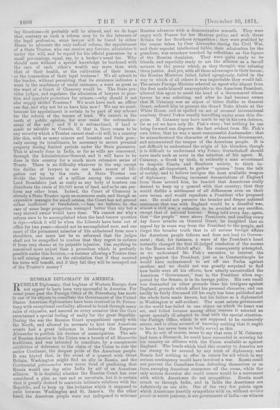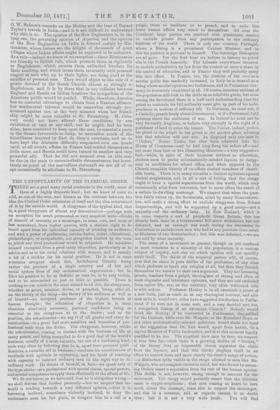RUSSIAN DIPLOMACY IN AMERICA.
RUSSIAN Diplomacy, that bugbear of Western Europe, does not appear to have been very successful in America. For some years past the Foreign Office of St. Petersburg has made it one of its objects to conciliate the Government of the United States. American diplomatists have been received in St. Peters- burg with exceptional cordiality, allowed to break through many rules of etiquette, and assured on every occasion that the Czar entertained a special feeling of amity for the great Republic. During the war the Russian Court sympathized openly with the North, and allowed its servants to hint that American events had a great influence in inducing the Emperor Alexander to publish his decrees of emancipation. The sale of Russian America to the Union was a breath of all Muscovite traditions, and was intended to conciliate, by a conspicuous exhibition of deference to the claim of the Union to rule the entire Continent, the deepest pride of the American people. It was hinted that, in the event of a quarrel with Great Britain, Washington might find an ally in Russia, and the Continental gobemouches were never tired of predicting that Russia would one day seize India by aid of an American alliance. It is doubtful whether the Russian Court has ever considered a plan so vast and so uncertain, but it is certain that it greatly desired to maintain intimate relations with the Republic, and to keep up the irritation which it supposed to exist between Washington and St. James's. On the other hand, the American people were not indisposed to welcome Russian advances with a demonstrative warmth. They were angry with France for her Mexican policy, and with Great Britain for her Southern sympathies ; they were gratified by the course taken by Czar Alexander during the Civil War, and their especial intellectual foible, their admiration for the grandiose, was somehow touched by reflections on the bigness of the Russian dominion. They were quite ready to be friends, and especially ready to use the alliance as a far-off menace to the power which, as they thought, was refusing them justice. And yet, with all these advantages in their favour, the Russian Ministers failed, failed egregiously, failed in the way in- which of all others it was improbable they would fail. The astute Foreign Minister selected an agent who almost from the first made himself unacceptable to the American President, allowed this agent to assail the head of a Government whose favour he was soliciting, and after he had become aware that M. Catacazy was an object of bitter dislike to General Grant, ordered him to present the Grand Duke Alexis at the White House, and BO spoiled an act of unusual international courtesy, Grand Dukes usually travelling under some thin dis- guise. M. Catacazy may have much to say in his own defence, for as yet we have only Mr. Fish's story ; but nothing he can bring forward can disprove the fact evident from Mr. Fish's own letter, that he was a most unsuccessful Ambassador ; that he misunderstood the character of the American Government, and misconceived the temper of the American people. It is not difficult to understand the origin of his blunders, though it is difficult to understand why Prince Gortschakoff should have made such an error in the selection of his agent. M. Catacazy, a Greek by birth, is evidently a man accustomed to despotic Courts and Southern society, to think in- dividuals all-important, to gather " opinion " from the talk of society, and to believe intrigue the most available weapon of diplomacy-. Hearing incessant denunciations of England from those around him, he fancied that Americans really desired to keep up a quarrel with that country; that they would dislike a settlement of all differences even on their own terms, and would repudiate a President who proposed one. He could not perceive the broader and deeper national sentiment that war with England would be a dreadful war, almost a civil war, a calamity to be avoided at any sacrifice, except that of national honour. Being told every day, again, that "the people" were above Presidents, and reading every day fierce attacks on General Grant, he imagined that an appeal lay in some way from the President to the people, and forgot the broader truth that in all serious foreign affairs the American people follows and does not lead its Govern- ment; that, for instance, a wave of the President's hand instantly changed the first ill-judged resolution of the masses in the Mason and Slidell affair. He consequently attempted, as we understand Mr. Fish's narrative, to interest the people against the President, just as in Constantinople he would have endeavoured to set off one Paella against another, and we doubt not was greatly surprised to find how futile were all his efforts, how utterly uncontrolled the American "Government.," that is, the President when sup- ported by the Senate, is in its foreign policy. His own recall was demanded on other grounds than his intrigues against England, grounds which affect his personal character, and can
hardly be fairly discussed till his reply has been published and the whole facts made known, but his failure as a diplomatist in Washington is self-evident. The most astute government
in the world has failed in one object on which its heart was set, and failed because among other reasons it selected an agent specially ill adapted to deal with the special situation.
Our Foreign Office, which is not supposed to be excessively astute, and is often accused of knowing nothing that it ought to know, has never been so badly served as this.
We do not, of course, mean to say that even if M. Catacazy had been a Bismarck, he could have succeeded in securing for his country an alliance with the Union available as against England. The bonds which bind this country to America are too strong to be severed by any trick of diplomacy, and Russia had nothing to offer in return for aid which in any serious contingency would have involved a war. Russia could not prevent the Canadians from defending themselves or us from sweeping American commerce off the ocean, while the only serious diversion she could create would be a movement with which Americans do not sympathize. Russia must attack us through India, and in India the Americans are definitively on our side. One of the very few points upon which Americans heartily sympathize with us, without arriere pensh or secret jealousy, is our government of India—as witness 0. W. Hohnes's remarks on the Mutiny and the tone of Bayard Taylor's travels in India—and it is not difficult to understand why this is so. The opinion of the New Englanders is, in the long run, the governing opinion of America, and the opinion of the New Englanders on India is formed mainly by Mis- sionaries, whose letters are the delight of thousands of quiet villages where Indian affairs might be supposed to be unknown. As a rule—indeed we know of no exception—these Missionaries are friendly to British rule, which protects them as vigilantly as Englishmen, which secures them unlimited freedom for their teaching, and which treats them invariably with personal respect as men who, up to their lights, are doing good at the sacrifice of personal ease. They would object to the rule of a power devoted to the Greek Church almost as strongly as Englishmen, and it is by them that in any collision between England and Russia on Indian frontiers the sympathies of the American public would be guided. While, therefore, America has no material advantage to obtain from a Russian alliance, her sentimental interest would be somewhat strongly pro- nounced against one, at the very moment when her friend- ship might be most valuable to St. Petersburg. M. Cats- cazy could not have altered these conditions by any exhibition of tact or any skill, but he might, had he been abler, have contrived to keep open the sore, to marshal a party in the Senate favourable to delay, to neutralize much of the friendliness inspired by Earl de Grey's exertions, and so to have kept the Alabama difficulty suspended over our heads until, at all events, affairs in France had settled theinselvei a little more, and Russia could have turned to another and very powerful ally. That he did not succeed even in this may be due in the main to uncontrollable circumstances, but is cer- tainly no proof of the marvellous statecraft we are all of us apt occasionally to attribute to St. Petersburg.



































 Previous page
Previous page